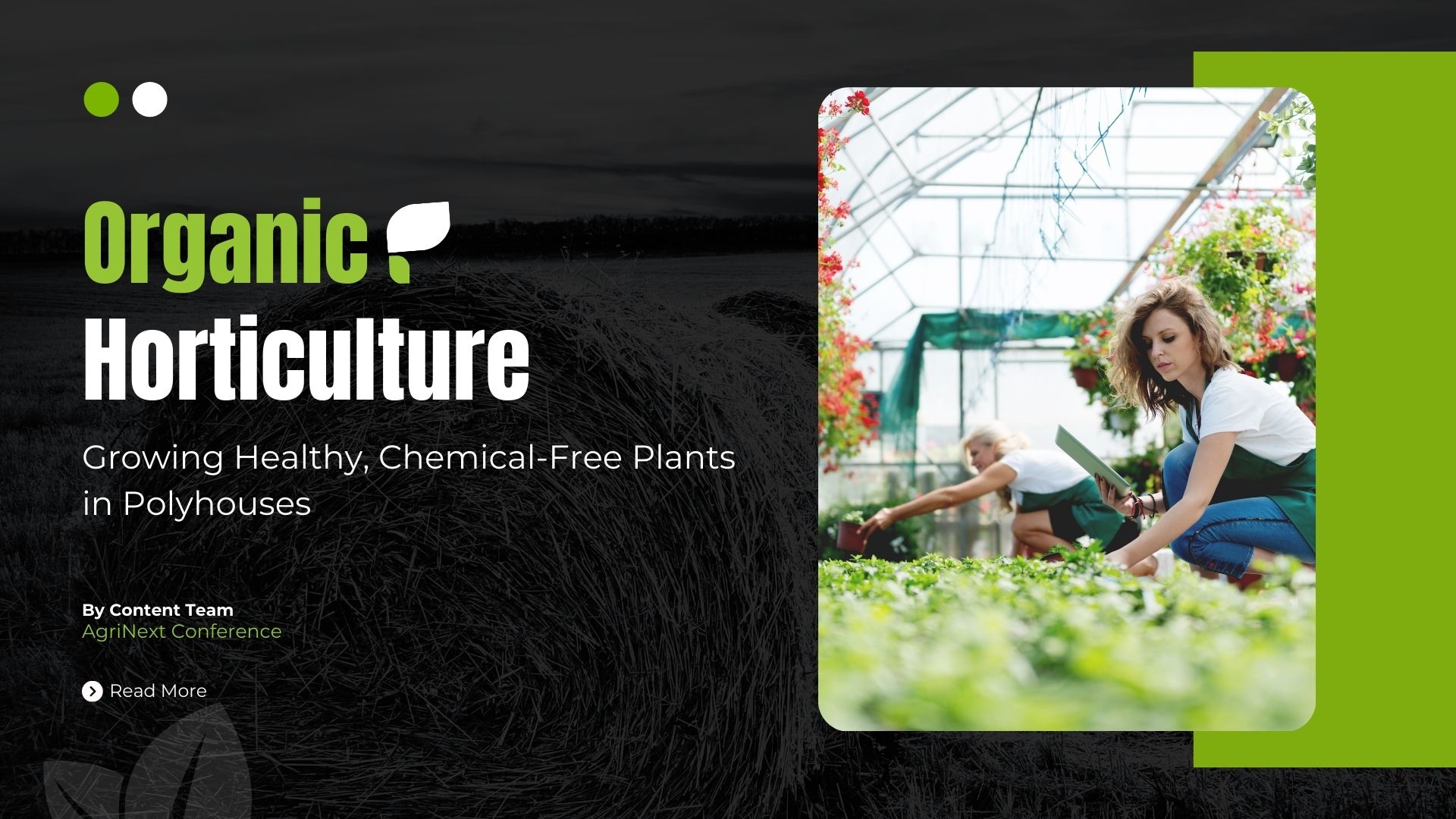
Organic horticulture is more than just a method of gardening; it’s a commitment to cultivating plants in harmony with nature. It focuses on growing fruits and vegetables without artificial pesticides or synthetic fertilizers, prioritizing the health of people and the environment. In this blog, we’ll explore the core principles, numerous benefits, and real-life examples of successful organic horticulture to inspire and guide you on your journey toward sustainable and eco-friendly gardening practices.
Key Principles of Organic Horticulture
Healthy Soil
Build and maintain fertile soil.
Use compost, manure, and cover crops to enrich the soil with organic matter.
Practice crop rotation and polyculture to prevent soil depletion and improve its structure and fertility.
Natural Pest Management
Encourage beneficial insects like ladybugs and predatory beetles that prey on pests.
Use natural pest deterrents like neem oil, insecticidal soaps, and garlic sprays.
Implement companion planting to naturally repel pests or attract beneficial insects.
Biodiversity
Cultivate a variety of plants to create a balanced ecosystem.
Incorporate native plants to support local wildlife and promote resilience against pests and diseases.
Water Conservation
Utilize mulching to retain soil moisture and reduce water evaporation.
Implement drip irrigation systems to deliver water directly to plant roots, minimizing waste.
Seed Selection
Choose varieties that are well-adapted to the local climate and soil conditions.
Benefits of Organic Horticulture
Healthier Plants and Food
Organic produce contains higher levels of vitamins, minerals, and antioxidants.
Avoiding synthetic chemicals reduces the risk of harmful residues on food.
Environmental Sustainability
Organic practices enhance soil health, improve biodiversity, and reduce pollution.
By minimizing chemical use, organic horticulture helps protect water quality and supports a healthy ecosystem.
Climate Resilience
Healthy, organic soils store more carbon, helping mitigate climate change.
Diverse plantings and natural pest management create more resilient gardens and farms.
Economic Benefits
Organic gardening can reduce costs associated with purchasing synthetic fertilizers and pesticides.
Organic produce commands higher prices in the market due to its perceived health benefits.
The Role of Polyhouse Cultivation in Organic Horticulture
Organic horticulture promotes biodiversity, soil health, and sustainable practices. One effective approach within organic horticulture is polyhouse cultivation.
What is Polyhouse Cultivation?
A polyhouse, also known as a greenhouse, is a protected environment designed to cultivate crops by controlling temperature, humidity, and light. This controlled setting enhances plant growth and yields while minimizing pest and disease issues.
Benefits of Polyhouse Cultivation
Extended Growing Seasons
Polyhouses allow year-round cultivation, extending the growing seasons beyond the limitations of natural weather conditions.
Enhanced Crop Quality
The controlled environment reduces pest and disease prevalence, leading to higher quality and healthier produce.
Efficient Water Use
Drip irrigation and other water-saving technologies in polyhouses contribute to water conservation, crucial in organic farming.
Increased Yields
Optimized conditions inside polyhouses result in higher crop yields compared to open-field cultivation.
Government Schemes on Polyhouse
The Indian government supports polyhouse construction through various subsidy schemes to promote modern agricultural practices and increase farmers’ income. These schemes aim to make polyhouse technology more accessible to farmers by reducing the initial investment cost.
Key Government Initiatives
National Horticulture Board (NHB)
The NHB offers financial assistance for constructing polyhouses, covering a significant portion of the cost.The subsidy typically ranges from 50% to 75% of the total expenditure, depending on the region and size of the polyhouse.
Mission for Integrated Development of Horticulture (MIDH)
MIDH provides subsidies for polyhouse construction under its Protected Cultivation component.The scheme encourages the adoption of modern technologies to boost horticultural productivity and sustainability.
State-Specific Schemes
Various state governments also offer their own subsidy programs tailored to regional needs.These schemes often complement national initiatives, further reducing the financial burden on farmers.
The success story of Krishna Polyhouse in Maharashtra, India
Krishna Polyhouse in Maharashtra, India
Background
Established by Krishna Kumar a Progressive farmer, this polyhouse has become a model for sustainable and profitable horticulture. Located in the Satara district, Krishna’s polyhouse spans about 2 acres and has been instrumental in producing high-quality vegetables and flowers.
Crops Grown
The polyhouse cultivates a variety of crops, including tomatoes, capsicum (bell peppers), cucumbers, and roses. These crops are chosen for their high market value and demand.
Technology and Methods
Krishna employs advanced polyhouse techniques, including drip irrigation, fertigation (fertilizer application through irrigation), and climate control systems. These technologies help maintain optimal growing conditions, reduce water usage, and enhance crop yield.
Economic Impact
By adopting polyhouse farming, Krishna Kumar has significantly increased his income. The controlled environment of the polyhouse allows for year-round production, reducing the risks associated with seasonal changes and extreme weather conditions.
Support and Subsidies
Krishna’s success was also facilitated by government subsidies and support programs aimed at promoting polyhouse farming. The Indian government offers financial assistance to farmers for the construction of polyhouses, making it more accessible and affordable.
Krishna Polyhouse is an excellent example of how polyhouse horticulture can lead to sustainable and profitable farming. By leveraging modern agricultural techniques and government support, farmers can achieve higher productivity and better quality produce. By embracing polyhouse cultivation, we can move towards a more resilient and productive agricultural future.
Conclusion
Organic horticulture offers a holistic approach to gardening, fostering a balanced ecosystem that benefits both plants and the environment. By embracing soil preparation, cover cropping, and sustainable practices, gardeners can unlock the full potential of their outdoor spaces. Whether in urban or rural settings, organic horticulture provides a path to
- Nourish the soil
- Nurture biodiversity
- Cultivate resilience
- Harvest abundance
In addition, the Indian government’s subsidies for polyhouse construction provide valuable support for organic horticulture. Polyhouses create controlled environments that enhance plant growth, extend growing seasons, and improve yield quality.
Join the journey towards a greener, more Sustainable future – one garden at a time.”
AgriNext Awards, Conference & Expo
AgriNext is at the forefront of promoting organic farming through sustainable practices. The conference showcases innovative techniques and solutions that prioritize soil health, biodiversity, and eco-friendly farming methods.
With dedicated sessions on organic agriculture, attendees can gain insights into the latest advancements in organic fertilizers, integrated pest management, and crop rotation strategies. AgriNext’s unwavering commitment to sustainability ensures that organic farming remains a viable and environmentally responsible option for farmers worldwide, paving the way for a more sustainable future.
Signup For AgriNext Conference Newsletter


